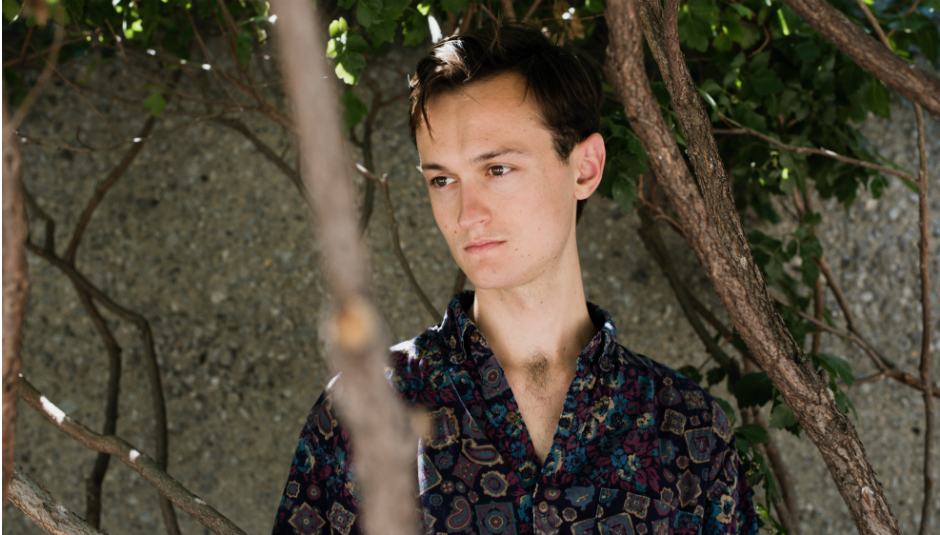“Well, this is not a diatribe, it’s a rolling seaside”, Ought-frontman Tim Darcy exclaims on ‘Saint Germain’, the earliest song he’s written for solo debut Saturday Night. Despite his early reservations in making the album, writing this music in overlap with Ought’s second LP Sun Coming Down proved to be fruitful for Darcy. With Ought, Darcy revels in spelling out those pesky conundrums that suffocate our everyday existence. Whereas Saturday Night, according to him, breathes out towards a more open-ended, timeless place.
Indeed, recording the album at Toronto's Grayson Matthews Studio with Amy Fort, Ross Gillard and musician Charlotte Cornfield provided a welcome echo-chamber for Darcy to meander and explore his feelings on a more subconscious level. “Amy, Charlotte and Ross were the ones who originally insisted that – if I ever wanted to use free studio time – they’d have access to this storage space in Toronto after hours," Darcy says with that typically soft-spoken, but very clued-in discourse. “From there, it was--"
He promptly breaks off his sentence, bracing for an impending sneeze that never comes. He sheepishly laughs: "I think I scared it off." He then finishes his original thought: "It became very clear to me that this album was something that should happen." Curiously enough, this tiny ripple in our conversation feels like a microcosm of Ought's overwrought laments on the toils of a grounded everyday life.
On the aforementioned 'Saint Germain' however, Darcy hypothesizes the idea that “creation is the loudest screech of escape, which explains why mine sounds like a scream.” That might be just as extramundane of a notion as the sneeze being your soul trying to escape the body.
DiS: So... are the rest of the Ought guys accounted for?
Tim Darcy: Yeah, Ben (Stidworthy) is in Oslo, Tim Keen is hanging out in LA for a bit and Matt (May), I think he’s in Montreal at the moment. Everyone’s doing well. I’m hanging out in Toronto right now. The band is still based in Montreal but each one of us is enjoying some downtime at the moment. The people who I made Saturday Night with live in Toronto.
And these people are...?
The main two entities are Ross Gillard and Amy Fort, who co-produced the record. They were the ones who originally insisted that – if I ever wanted to use free studio time – they’d have access to this space after hours. Ought was working on Sun Coming Down at the time, and I had been feeling this urge to record some solo songs. I hadn’t really released any album apart from the band, whereas everyone else in Ought released other projects in the past. I felt this urge to get back to this ‘other’ world of songwriting. The opportunity presented itself. Originally, I was going to record a song or two. But as we began, it sounded really good, so the three of us decided to keep going. I went back to record probably four or five times over a six-month period to finish this album.
I read that you initially had some reservations about making this record.
Well, I had lots of songs! I was more or less deciding which ones were going to make it. And then pairing those songs with newer things I wanted to record, music that was written more concurrently with the making of Saturday Night. Before we started recording, I was so knee deep into the writing process for Sun Coming Down that I felt wary about switching these different mindsets. And wary to be creative again in a studio within a whole new environment. And especially, to be a different vocal presence. Ross and Amy were like: “Just do it”. We’d go in and just jam basically, put up some mics and just have it be a fun thing. So they convinced me to go in, and once we started playing, it immediately felt so good.
You just said you had this “urge to write”. Can you specify that a little bit?
Sure, part of the reason was the fact that Ought is more a collaborative process, and very much like a specific project. It didn’t always satisfy that personal freedom of deciding what to write about. Saturday Night is a very personal document for me. Obviously, the songs are quite different from what Ought does. I would hope that those differences are obvious. I’ve been very touched by the response to Saturday Night so far.
This record has a very metaphysical, almost spiritual gravitas to me. Of course, that could mean a lot of things. But let’s turn this around: could Saturday Night be your personal tryst with spirituality?
Definitely, to a varying degree. It’s tough to explain because to me, there’s a strong overlap between an artistic perspective and a spiritual one. The art that moves me always interacts with the heart. Whether you want to call that ‘spiritual’, even when you say that something simply moves you, that means that certain art speaks to you on a deeper level. Which is something I’m always aiming for. There’s a lot of interesting art that’s more cerebral in nature, but I associate myself with music that moves on a more emotional level. That was definitely a motive to enter a deeper well again, and create from a more emotional place.
You say “again”, which suggests you have tried it before.
Yeah, I’ve been writing songs since I was sixteen. In that vein, ‘not always successfully’. I’m not saying that Ought doesn’t come from that emotional place. There are just particular songs written by Ought that I personally connect to most, whereas with other songs, maybe someone else in the band relates to those more intimately. I think that’s the nature of writing with four different people.
Some songs on Saturday Night are pretty old, others are actually very recent. Makes me wonder what song on the record was the starting point.
The oldest song on the album is probably ‘Saint Germain’. That’s a song I just haven’t been able to let go of. I’ve been having trouble recording it, even by myself, but also when we were making the record. In an earlier version we thought about cutting the song. In the end, we kind of reworked the song a bit, especially the instrumentation going on around me. Now it’s one of my favorite tracks on the record.
That song actually feels recent to me. It’s like a breaking-the-fourth-wall song, where you open up about your thought process in this very candid way.
Yeah, that’s a great point. That was part of what working on this album meant, that these songs didn’t necessarily live in one specific moment. I’ve written music that was compositionally good, but it never had this timeless urgency. Or non-urgency… these might be two contradicting terms. But my aim is to definitely evoke a timelessness, where it feels like that particular song could stay with you for a very long time. There are definitely songs I’ve written which are very closely related to a specific moment in my life. That might mean that they were necessary to write at the time.
But especially as a young person, you go through so many different phases of being. If you come ideally towards – as an artist or a voice – to a consistent sense of self. You can do that by trial and error, being able to feel out things that resonated with you after the fact. For example, keeping a diary of relationships with people, conversations that you have, clothes that your wear. However you manifest yourself, and feeling that shift over time. If that makes sense. I think that’s what some of these songs evoke. ‘Saint Germain’ and ‘You Felt Comfort’, two of the older songs, could be sung in a timeless way on my first proper record. I’m so glad to hear that ‘Saint Germain’ felt new to you, because that was exactly part of the point.
It might be a cheesy comparison, but for some odd reason, this record reminds me of that Tom Cruise movie Edge Of Tomorrow. Like this self-imposed, safe arena where you can die a million deaths and chronically fuck up, and by doing so, give these songs multiple dimensions and trajectories. Does that make any sense?
It does. I like that idea of rebirth, and I think that we as human beings have the ability to do that. I’ve seen friends go through really dark periods. Especially if you act a certain way for awhile, you get to a point where you think” “I can’t just change.” I believe that is just our own demons telling us to stay stuck in patterns. That is just the same fear of telling us not to change. Patterns are inevitable. We look for patterns as creatures, we are comforted by them. And part of that is about establishing your own patterns. This can be a good thing: a pattern of writing every day, or working out every day. Something that brings you insight or well-being. But you can also get into patterns that aren’t as healthy… so it’s important to recognize the liquidity of your person, the fact that we can adapt and change.
Liquidity, that’s something I’ve more or less been preoccupied with when reading your lyrics. It doesn’t seem like you chew over the words that come out of your mouth. The lyrics are uttered or sung like a cascade of abstract phrases and non-sequiturs, without stopping to edit yourself.
I think yes, that’s true in a sense. The point of a lot of these songs is to reach for a deeper meaning. I think that can come from writing that is not per se as earnest or direct. Sometimes I would like to know exactly what a song is about, but it depends on the writing. In a novel or essay, for instance, that continuity is important. In music or poetry there’s generally more of an amorphous feeling, and that holds as much weight as a perfect coherent sentence. And maybe even more refreshing, because it’s harder to get to that place of triggering something emotional that’s buried deep within you. To me the songs have meaning, but the meaning is five-headed. When people ask: ‘What does this song mean?’ I could talk about what it’s about, but what I’m actually trying to do, is to evoke the feeling itself. Even in the process of making Saturday Night I felt at times: “Should I go back and change this?” But once I fiddled with it, it felt like part of the magic was gone.
Sonically it’s a really weird, spectral record too. It sounds a bit like Bob Dylan’s transition between his folk and electric band-phases in the sixties, where he tried to produce them on top of one another.
Yeah, the record starts off much more fleshed out, like in a full band set-up. And then it gradually falls away. And that was also very intentional. To not have the soft songs peppered in between. I really wanted Saturday Night to feel more intimate as it went on. ‘What’d You Release’ is obviously as sparse as you can get away with in a song, without it becoming an a cappella piece. It’s just voice and piano. I wouldn’t want anything else on that track.
Vocally you are stretching your limits too. The title track has this Scott Walker-y gravitas. What's the story behind that track in particular?
That track happened in the studio. I had a handful of lines written, and I knew I wanted vocals on it. But there wasn't really a melody planned for it. In felt this pull to do some bow guitar stuff, something I haven't really done before. So I have no idea where that desire came from. I don't think I've even seen someone play bow guitar before. I played with open tunings a bit, and I generally like to trust my gut.
I tried once and it wasn't really connecting…and then I tried again. And all of a sudden, that moment arose when you're hitting that nerve and you realize you're making something good. That twenty-minute recording clip was eventually cut down. Then we recorded it live again with Charlotte on drums, interacting together with it a little bit. The title track is an example of me taking full advantage of all that free studio time. We were there by ourselves at night, so I felt no restrictions in doing something which would otherwise be very stressful in a studio you pay a lot of money to record in.
‘What’d You Release’ is also new territory for you: the piano ballad.
That's actually Charlotte playing the piano on ‘What'd You Release?’. The thing is, we weren't even going to do that song. We were kind of messing around, laying down cables. And Charlotte was playing the melody in the same key as ‘What'd You Release?’. Then I told her, "It's just three chords played over and over again". So she started playing, and I started singing. And Ross was like, "Don't move, we gotta do that one!" We put up some mics recorded it with me on guitar, and we ended up just deleting the guitar because the piano and voice worked so well together.
'Still Waking Up’ sounds like Roy Orbison, that's kind of like a fickle love song, right?
I'm flattered by the Orbison comparison, he was definitely a touchstone. And yeah, it IS a love song. But it's also more complicated. There's attraction, a strong feeling, but there's something in the way that's keeping it from becoming a full connection. The narrator is realizing that the connection isn't going to develop into a deep love.
About instrumental tracks like 'First Final Days' and 'Beyond Me', why was it important to go beyond just lyrics.?
I listen to a lot of ambient music. Especially in like the first year of touring with Ought, I'd pretty much exclusively listen to ambient music and folk music. And I think there's like a meditativeness to music without vocals. Especially as a vocalist myself, those instrumental parts are important, because they provide like a particular release that's hard to achieve with just the voice. I find with the voice, there's an element of catharsis, and with music, I can achieve a release. The catharsis of letting something out of your mouth, and the release of forgetting you have a body.
Saturday Night is out via Jagjaguwar on February 17. For more information about Tim Darcy, visit his official website.
Photo credit: Shawn Brackbill






















